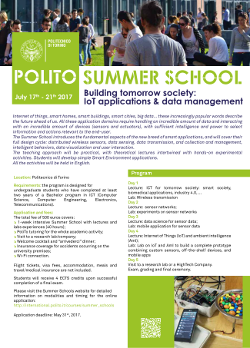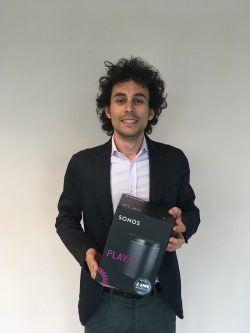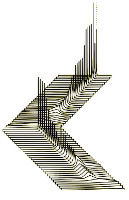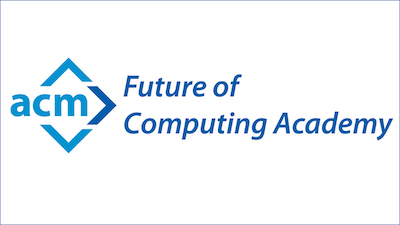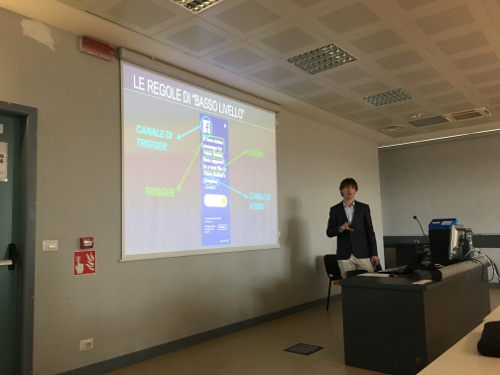- Details
Internet of things, smart homes, smart buildings, smart cities, big data… these increasingly popular words describe the future ahead of us.
Politecnico di Torino is organizing a Summer School on IoT applications and Data Management, aimed at students enrolled in B.S. degrees worldwide. The school will cover the full design cycle of data-intensive distributed IoT systems, with a practical teaching approach and hands-on experiences. In one week of classes (morning) and laboratories (afternoon), different topics ranging from wireless sensor networks to mobile applications, from data science to ambient intelligence, will be presented by Politecnico professors expert in the field. A prototype working system will be build by the students during the school.
Applications are open, you may enroll on-line.
- Details
In the past months, the former Ambient Intelligence students were contacted filling a thorough questionnaire trying to understand the major "pain points" they had during the development of their AmI system.38 students replied and devoted 30 minutes to analyzing the sources of difficulties, and of the time spent, in different parts of a AmI system prototype. The results of the survey will be used for developing new methodologies and tools able to ease the task for future novice IoT programmers.Some preliminary survey results will be presented at the forthcoming COMPSAC'2017 conference.
To thank the survey participants for their contribution, we randomly selected one lucky winner for a Solos Play:1 device (sponsored by Nital). Congratulations to the prize winner for his luck!
- Details
Alberto Monge Rofarello will participate to the 3rd ACM SIGCHI Summer School on Computational Interaction. The summer school will be held on Lake Lucerne in Switzerland, organized by ETH Zurich, from the 12th to the 17th of June 2017.
The goal of the summer school is to teach PhD students and researchers the foundations of computational tools in the context of user interface design and their application in interactive systems. In particular, the summer school will be organized around the common themes of optimization and machine learning. The first theme aims at solving interaction and user interface design problems by deriving interface configurations which satisfy constraints and maximize performance criteria. The latter theme, instead, introduces a principled and robust approach to designing a transformation from input to useful action.
The summer school will consist in a mix of theoretical lectures and pratical sessions, and it will close with a full-day hackaton.
- Details
Congratulations to Luigi De Russis, who has been selected as a member of the ACM Future of Computing Academy (FCA).
ACM FCA will lead the way in helping ACM develop new models of participation, collaboration, and career support. The Academy will advise on the problems ACM should tackle, how ACM should adapt to the needs of future generations as well as on how the computing field should evolve and where computing can help address challenging global issues.
Luigi will join an inaugural class of early career computing professionals, to shape the academy's governance structure and agenda. Moreover, he will attend the ACM celebration of 50 years of Turing Awards on June 23 - 24 at San Francisco.
- Details
The e-Lite research group will participate to the ACM Conference on Human Factors in Computing Systems (CHI), one of the most important conference in the field of human-computer interaction. The 2017 edition will take place in Denver, Colorado, USA, from the 6th to the 11th of May.
Luigi De Russis and Alberto Monge Roffarello will present two late-breaking works on Monday and Tuesday (May 8-9) about notification preferences and end-user programming in the IoT.
- Details
The development of Internet of Things systems implies an increasing number of devices that interact with each user, every day and in every place. A growing need of programming, personalizing, and customizing the joint behavior of such devices by non-programmers is currently handled by rule-based programming platforms, such as IFTTT (if-this-then-that). Recent studies show that such platforms force the user to work at a "low-level" (i.e., at the device level), while end-users would prefer to work at a slightly more abstract level, where rules are more general and understandable.
The thesis of Fabio Ballati, discussed on March 2017, explores this field and proposes a methodology for automatically mapping low-level rules (e.g., extracted from IFTTT) onto a more abstract representation (high-level rules). The obtained translation process is fully automatic and relies on a dataset of IFTTT public rules.
The thesis analyses the rules present in the dataset with the aim of extracting the equivalent rules in the high-level representation, by producing a corresponding categorization of abstract IoT devices and services (i.e., by grouping objects for functionality, mainly). Then, a suitable algorithm was designed and implemented to perform the automatic mapping between the two representations, starting from the 200,000 low-level rules available in the dataset.
Finally, the thesis covered the validation of both the proposed mapping and the high-level representation. For validating the mapping procedure, the number of saved rules, per user, was computed: users in the dataset could compose 15%-33% less rules with the high-level representation, and still obtain the desired behavior for their IoT services. For validating the high-level representation, instead, a user study with 8 participants was carried out. The study asked participants for composing some rules in both the representations, starting from the description of some scenarios. As a result, participants largely prefer composing rules in the more abstract representation.


